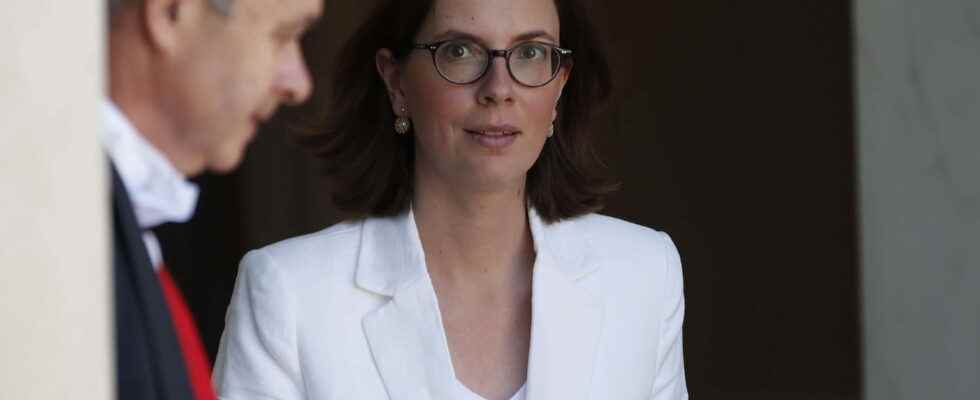MINISTER ECOLOGY. It is a female trio who is in charge of ecology in the government: the Prime Minister, assisted by Amélie de Montchalin at Ecological Transition and Agnès Pannier-Runacher at Energy Transition.
[Mis à jour le 20 mai 2022 à 17h19] Amélie de Montchalin is the new Minister for Ecological Transition and Territorial Cohesion: she should very quickly take charge of a large, circumscribed perimeter, since Elisabeth Borne and Emmanuel Macron have also created a Ministry for Energy Transition, all under the supervision of Matignon.
The President of the Republic promised during his campaign that ecological and energy planning will be the cause of his five-year term. He assured that he wanted to go “twice as fast” on these questions with the aim of placing the subject “at the heart of the years to come in France.” To this end, the Head of State had already announced a remodeling of the ecology portfolio, with now very precise outlines and directly under the leadership of the Prime Minister. The objective: to considerably reduce interministerial discussions around the ecological issue by bringing more cross-functionality into decision-making.
The new government therefore does not include a Ministry of Ecology as such, as has been known for years. But far from the President of the Republic the idea of suppressing such an administration. The shift made by Emmanuel Macron in the direction of ecology was concretely translated on April 16. That day, during a meeting in Marseille (Bouches-du-Rhône) during the interval between the two rounds of the presidential election, the outgoing head of state had outlined the outlines of the future “green” ministry ( and much more) of the government to come, thus announcing to review the perimeter of a ministry sometimes devoted to the Environment, sometimes to Ecology and Sustainable Development, or, lately, to the Ecological Transition, enlisting, sometimes (as currently ), the Ministry of Transport or the Ministry of Housing.
Who is Amélie de Montchalin?
Before being appointed Minister for Ecological Transition and Territorial Cohesion, Amélie de Montchalin had been, since July 2020, Minister for Transformation and the Public Service. Previously, she had joined the government as Secretary of State in charge of European Affairs, in 2017. But before entering the executive team, she had managed to be elected as a deputy, in the 6and Essonne constituency.
What functions for the minister in charge of “ecological and territorial planning”?
Amélie de Montchalin, in charge of the “ecological and territorial planning” file, “will have the mission of organizing with local elected officials the environmental transition in each territory” detailed Emmanuel Macron. Through this administration, the Head of State intends to allow the thermal renovation of 700,000 homes per year during the five-year term, improve air quality by launching a “massive effort” for air purification in schools, hospitals, retirement homes and public buildings, accentuate measures aimed at promoting local products and short circuits in collective catering, but also develop means of transport (electric car “at less than 100 euros per month”, metropolitan RER, bicycle , train) while investing in river and rail freight.
What role for the Minister of Energy Planning?
Two ministers under the control of Elisabeth Borne will therefore be responsible for “ecological planning”. Agnès Pannier-Runacher will be responsible for energy planning. It will be for him “to make France the first great nation to get out of gas, oil and coal.” An achievable objective according to Emmanuel Macron via the planning of an “energy sobriety strategy, because the energy that pollutes the least is the one that we do not consume.”
Among the other missions noted on the job description: multiply by ten the power generated thanks to solar energy, deploy 50 offshore wind farms by 2050, initiate the construction of six new nuclear reactors – “the only energy that does not produce no greenhouse gases and which does not depend on the weather”-, building a hydrogen strategy for transport (planes, trains, boats, buses). “Hydrogen is produced by electrolysis. For that, we need electricity, it is for this reason among others that we will need in our country to produce more non-carbon electricity by renewables and by nuclear but this carbon-free hydrogen is the one that will allow us to do without fuel oil, natural gas, at the bottom of fossil fuels”, had detailed the then candidate.
Who are the previous Ministers of Ecology?
The Ministry of Ecology has had various names. It was not until 2002 that it became the Ministry of Ecology, being previously named the Ministry of the Environment. In 20 years, no less than 15 ministers have succeeded:
- Roselyne Bachelot (May 7, 2002 – March 30, 2004)
- Serge Lepeltier (March 31, 2004 – May 31, 2005)
- Nelly Olin (June 2, 2005 – May 15, 2007)
- Alain Juppé (May 18, 2007 – June 18, 2007)
- Jean-Louis Borloo (June 19, 2007 – November 13, 2010)
- Nathalie Kosciusko-Morizet (November 14, 2010 – February 22, 2012)
- François Fillon (February 22, 2012 – May 10, 2012)
- Nicole Bricq (May 16, 2012 – June 18, 2012)
- Delphine Batho (June 21, 2012 – July 3, 2013)
- Philippe Martin (July 3, 2013 – March 31, 2014)
- Ségolène Royal (April 2, 2014 – May 17, 2017)
- Nicolas Hulot (May 17, 2016 – September 4, 2018)
- François de Rugy (September 4, 2017 – July 16, 2019)
- Elisabeth Borne (July 16, 2019 – July 3, 2020)
- Barbara Pompili (July 6, 2020 – May 16, 2022)
